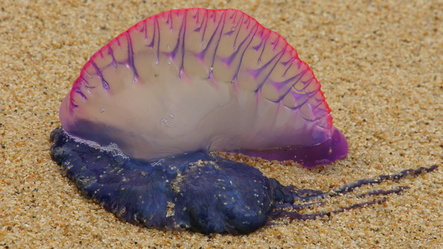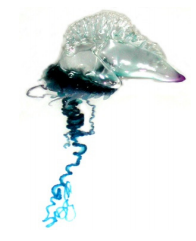|
Along with most other sea creatures, we think Portuguese Men O'War (Physalia physalis) are really cool. However, please do not touch or approach them if you see one in the water or on the beach. They can have long tentacles and pack a nasty sting--Christian, our director of Field Research, once got a little piece of tentacle on his toes and it's about the grumpiest we've ever seen him.
Although people often think that Portuguese Men O'War are jellyfish, they're actually something called siphonophores--instead of being one organism made up of individual cells, it is a colony made up of tiny specialized individuals called zooids, all working together. The gas filled float at the surface, called a pneumatophore, can be pink, purple, blue or some combination. Tentacles are normally 30 feet long or less, however, individuals have been recorded with much longer (165 ft) tentacles, so it's a good idea to give a Man O'War a wide berth. Even individuals that have been washed up on the beach for a few days may still be able to sting.
0 Comments
|
Field Notes
Archives
July 2021
Categories |
|
Partner with us! We are always looking for new schools, scientists, and non-profit organizations to partner with. Please contact us here to start a conversation.
Hear from us! Sign up for our newsletter to hear about what is happening at Field School as well as upcoming offers and specials. |



 RSS Feed
RSS Feed